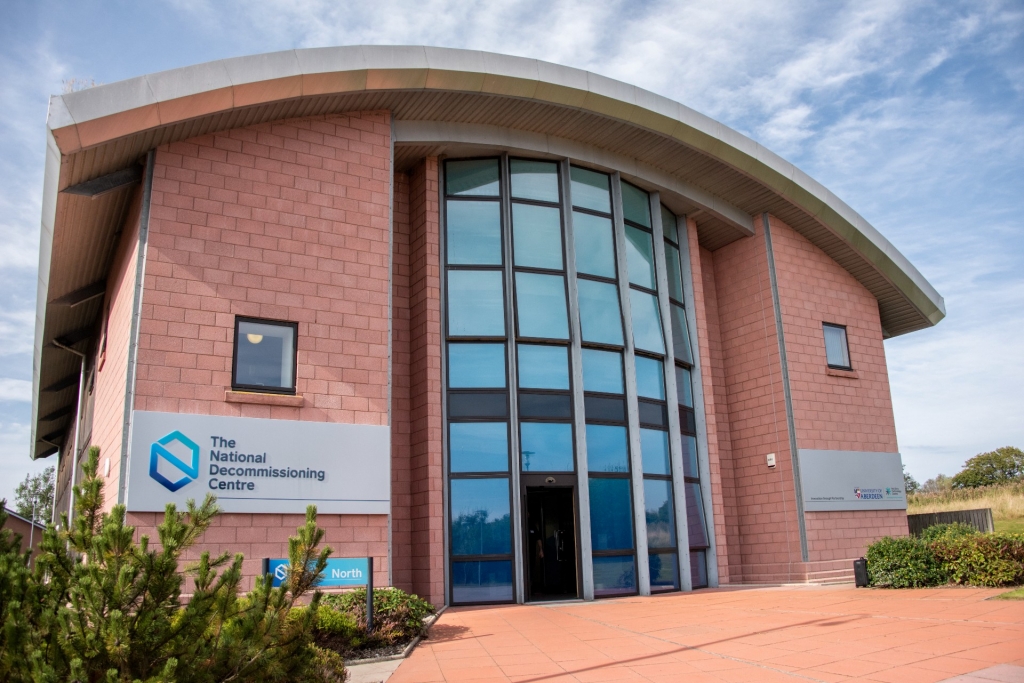About The National Decommissioning Centre
 The National Decommissioning Centre (NDC) is a partnership between the University of Aberdeen, the Net Zero Technology Centre (NZTC) and industry, part of the Aberdeen City Region Deal.
The National Decommissioning Centre (NDC) is a partnership between the University of Aberdeen, the Net Zero Technology Centre (NZTC) and industry, part of the Aberdeen City Region Deal.
Combining industry expertise with academic excellence, the NDC is working in partnership with the energy sector to lead research and development (R&D) that supports the sector to achieve cost and emissions reductions, improve environmental outcomes and transform approaches to deliver sustainable net zero decommissioning.
The NDC builds on the world-leading R&D capability at the University of Aberdeen in areas such as decommissioning technologies, predictive modelling, environmental assessment and the economics and regulatory aspects of decommissioning.
Working across the oil and gas, nuclear and renewables sectors the NDC adds value and creates competitive advantage by linking industry demand and expertise with academic capability and skills.
The NDC collaborates nationally and globally with universities, R&D institutions, and innovation centres active in decommissioning and energy transition, and partners with fishing, marine, safety and environment organisations.
To strengthen its world-leading R&D, the Centre has invested in state-of-art facilities, including a Marine Simulator, Underwater Laser Cutting System and a Well Plugging and Abandonment (P&A) Barrier Qualification Test Chamber. Other facilities include a
high-tech digital visualisation suite to enable collaboration, high specification engineering laboratories and a large hangar space for the design and development of decommissioning technology, as well as a suite of commercial subsea engineering test facilities.
About the Net Zero Technology Centre
NZTC was established in October 2016 with £180 million funding as part of the Aberdeen City Region Deal. 
Its goal is to support the energy industry to develop and deploy technology to accelerate the transition to an affordable net zero North Sea. It co-invests with industry to diversify the supply chain and create a technology led, globally competitive supply chain for our future net zero energy system. It is committed to a culture of innovation and helping to attract the next generation of engineers and scientists to the energy industry.
NZTC invests in partnership with industry, local and national government, and academia to address major energy challenges, working across a range of sectors from renewables to manufacturing. People and technical innovation are at the heart of what we do.
NZTC was created as part of the Aberdeen City Region Deal, a long-term improvement programme to enhance growth, competitiveness, connectivity, infrastructure, housing, and employment into an already successful regional economy. It has a strong track record of delivery and to date has evaluated more than 1,000 technologies, invested in more than 250 projects, delivered more than 64 field trials, grown more than 25 new companies, and delivered more than 20 commercialised technologies.
The Deal is supported by the Scottish Government, UK Government, Aberdeen City Council, Aberdeenshire Council and Opportunity North East. You can find out more about the Aberdeen City Region Deal on the Delivering for Scotland website.
About the University of Aberdeen
 The University is the fifth oldest in the UK, dating back to 1495. Over the past 500 years we have proudly offered students life-changing opportunities through greater knowledge and learning.
The University is the fifth oldest in the UK, dating back to 1495. Over the past 500 years we have proudly offered students life-changing opportunities through greater knowledge and learning.
Its vast experience in teaching and research – along with our modern, 21st century outlook – enables us to offer the same great opportunities to students today.
This rich heritage, world-leading research and learning excellence has contributed to associations with five Nobel Prize winners.
The University offers a wide range of energy-related degree and research programmes across business, law, engineering, geosciences, natural sciences and computing. A strong interdisciplinary focus makes graduates more work-ready with a wide breadth of experience.
The University consistently strives to move alongside industry, refining programme content and developing new degrees in-line with the ever-changing industrial demand, including the world’s first and only Master’s degree in offshore decommissioning.

